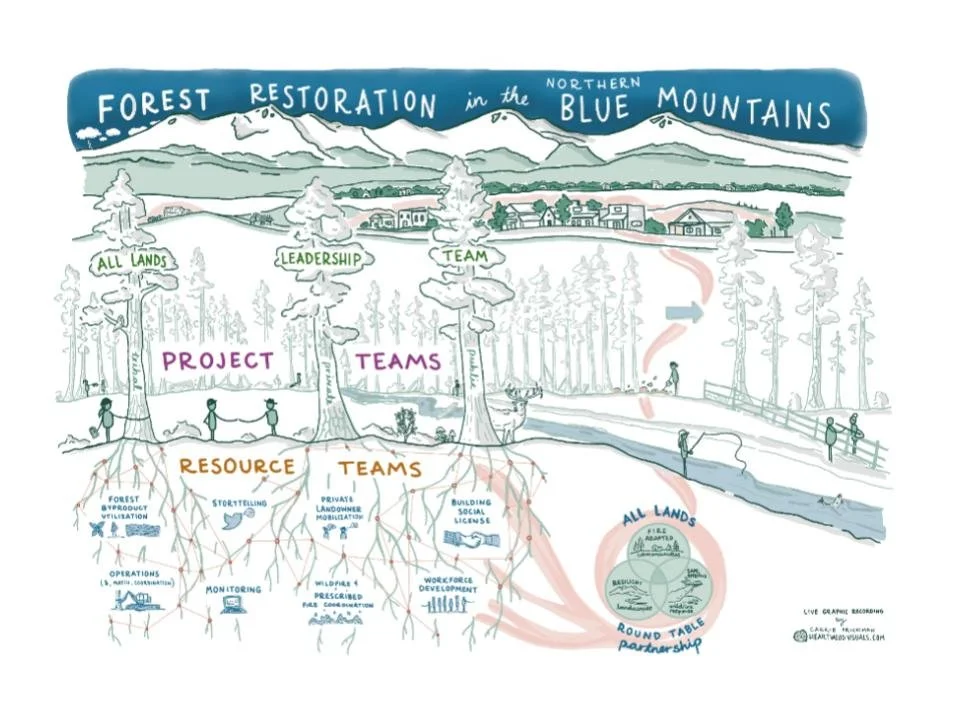Editor’s note: You can also view this post in PDF format in our Tools and Products section of our website.
Building All-Lands Capacity Across The Northern Blues: Peer-Learning Exchange Workshop
The following summary was developed from a virtual peer-learning exchange hosted by and for the Northern Blues All Lands Partnership, and organized by Rural Voices for Conservation Coalition (RVCC), Wallowa Resources, the Umatilla and the Wallowa-Whitman National Forests. Hosted: December 9, 2021
Background
The Northern Blues region of northeast Oregon and Southeast Washington has a rich history of collaborative restoration spanning federal, state, tribal and community partners. Different coordinating bodies were formed to support this work, including the Northern Blues Cohesive Strategy Partnership, the Northern Blues Forest Collaborative, and the My Blue Mountains Woodland Partnership. When the region was awarded funding through the Collaborative Forest Landscape Restoration Program in 2020, it catalyzed the merging of these existing efforts into a more integrated all-lands framework known as the Northern Blues All Lands Partnership. Over the past year, the region’s partners have worked hard to align their vision, mission, goals and respective roles and commitments, culminating in a partnership MOU that was executed in the Fall of 2021.
The partners carefully designed an organizational and coordination structure to support their alignment and increase the efficiency of their efforts. This structure includes a Leadership Team, Resource Teams, Operations Team and county-based Project Teams.
An artist’s rendering of the partnership’s framework for all-lands coordination against the backdrop of the Northern Blues
Within this framework, the project teams are considered the “doers” of stewardship work - they are the people and partners that implement cross-boundary forest and fire resiliency projects, work with forest landowners, and identify new project opportunities. A partnership survey circulated in Fall of 2021 indicated that these teams needed more opportunities to learn from and connect with one another. In response, this peer exchange was designed specifically to build the capacity and relationships within those teams.
Objectives
The core objectives identified for this peer exchange were to:
Build relationships between partners in each project team through group discussions and workshopping ideas and next steps.
Explore how the Northern Blues Partnership can add value to cross-boundary forest restoration planning and implementation, and influence the prioritization of current and future projects with partners in the region.
Foster conversation about the vision and need for all-lands work from locally based federal and state agency leadership.
Improve project team members’ understanding of the strategies and tools used successfully by other all-lands groups in the region.
Learn about specific resources and tools available to support all-lands work.
Participants
Forty-five people participated in the training, including:
Peer exchange planning team members
Members of the Northern Blues All Lands Partnership Leadership Team and Operations Team who assisted with facilitation
Members of the five project teams:
Garfield County (WA) Team
Wallowa County (OR) Team
Umatilla County (OR) Team
Union County (OR) Team
Baker County (OR) Team
Presenters from Rural Voices for Conservation Coalition, Klamath Lake Forest Health Partnership, and the Central Wasco County All-Lands Project
Among the partners who joined the exchange were natural resources and forestry staff from the Nez Perce Tribe and Confederated Tribes of the Umatilla Indian Reservation; NRCS district conservationists; Forest Service district rangers; staff from Washington’s Department of Natural Resources; unit and stewardship foresters from Oregon’s Department of Forestry; Extension staff from Oregon State University; and staff from non-profit organizations.
Peer Exchange Agenda
Meeting presentations and breakout sessions were provided on the following topics:
Welcome and commitment of support from local leaders, including Nils Christoffersen, Bill Gamble, and Jay Gibbs
Break-out session #1: Get-to-know-your project team and share project ideas
All-Lands Coordination 101 - best practices, lessons learned across the West, and exciting new funding opportunities on the horizon
Presentations from the East Face of the Elkhorns project, Central Wasco All-Lands Project, and Klamath Lake Forest Health Partnership
Break-out session #2: Review of takeaways and topics to explore further as a project team
Tools, authorities, and funding sources for all-lands project implementation
Break-out session #3: Interactive project planning exercise within project teams utilizing GIS mapping
Break-out session report-outs and discussion
A Northern Blues project map, demonstrating the diversity of work, project areas, and collaborations currently happening among partners in the region
Discussions and Break-Outs Takeaways
Below are a few takeaways from the session:
Local leadership from Wallowa Resources, the Forest Service, and NRCS indicated their strong commitment to supporting the Northern Blues All Lands Partnership and noted the unique role of the project teams to guide implementation. This mode of working together presents many opportunities for the Northern Blues region, but requires a high level of trust, communication, and risk.
Through past research and peer-learning exchanges, RVCC has identified certain characteristics or elements that are common to successful all-lands efforts. Those include intentionality among partners, the establishment of governance structures, the use of partnership tools, and the creation of systems for adaptability and resilience.
“Flash presenters” associated with other all-lands projects touched on key factors important to their efforts, including the importance of robust landowner outreach and education, and strategically forming subcommittees to divide up the myriad elements of all-lands work.
Attendees noted that developing an outreach and funding strategy that brings all players to the table is a complex task - many project areas include a mixture of private (and sometimes absentee) landowners, industrial lands, tribal lands, utility and railroad right-of-ways, federal land, county commissioners, and recreational sites / ski areas.
One project team brainstormed new or unexpected partners that could be incorporated into their all-lands project. For example, the group discussed how the local power company could have an interest in a wildfire risk mitigation project due to potential for ignitions from power equipment and suggested enlisting city staff to help with landowner education efforts about the value of cross-boundary restoration treatments.
The group agreed that capacity to implement is a concerning bottleneck for their work, despite the influx of federal and state funding opportunities in the past year. There is often not enough personnel to spend new funds and a lot of “low-hanging” fruit has already been treated.
Many participants mentioned that completing cultural resource surveys is a common bottleneck for accomplishing stewardship work. Several project teams discussed strategies for overcoming this barrier, including working with tribal agencies, leveraging NRCS funding, enlisting non-profit partners on contract, and engaging archeology departments of local universities.
One project team discussed the benefits of closer coordination between agencies to stagger implementation timelines in order to work within available contractor resources.
Connect with the Organizers
Becca Shively, Program Manager
Rural Voices for Conservation Coalition
contact: bshively@wallowaresources.org
Alyssa Cudmore, Forestland Program Manager
My Blue Mountains Woodland Partnership / Wallowa Resources
contact: alyssa@wallowaresources.org
Amber Ingoglia
Natural Resources Partnership Coordinator
Forest Service Umatilla and Wallowa-Whitman National Forests
contact: amber.Ingoglia@usda.gov
This Peer Exchange was hosted by the Northern Blues All Lands Partnership and Rural Voices for Conservation Coalition with support from USFS Region 6.



